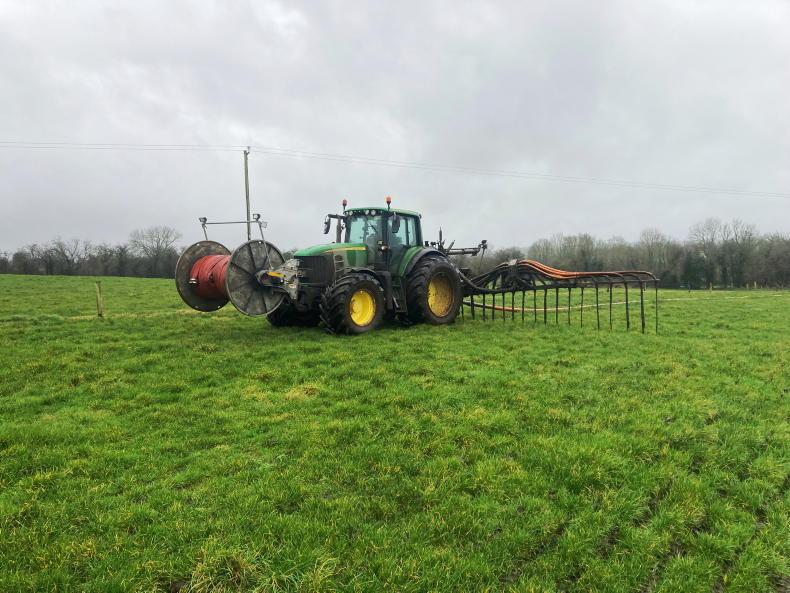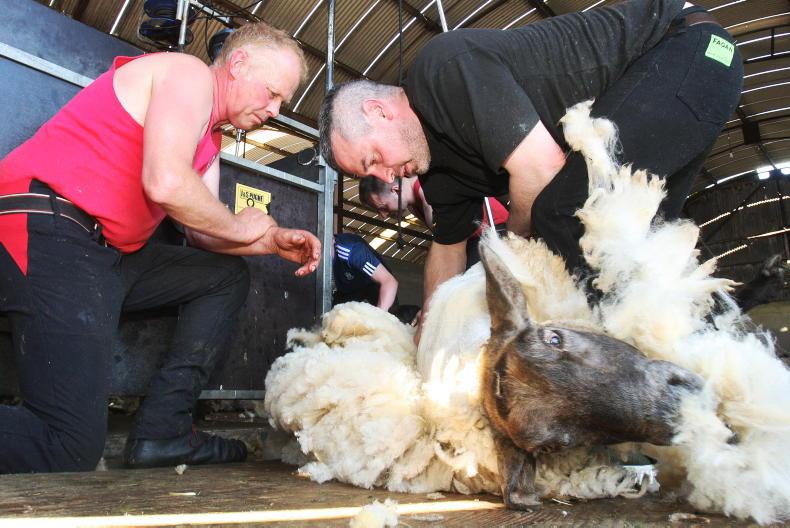The general public won’t forgive agriculture if it doesn’t do its bit to lower greenhouse gas (GHG) emissions every year, a leading NI arable grower has suggested.
Addressing the Young Farmers’ Clubs of Ulster (YFCU) sustainable farming conference at CAFRE’s Loughy campus last Thursday, Co Down grower Patrick Flynn said farmers must aim for year-on-year improvement. “Ignorance of the issue won’t be forgiven in the future,” he suggested.
The starting point is to partake in carbon auditing, and while Patrick acknowledges that carbon calculators are not perfect, he said they do make you think about where changes can be made that will both reduce emissions and make the farm more profit.
Output
Comprising over 550 acres in a 10-mile radius of the main yard outside Castlewellan, most of the Flynn farm is in crops, with 30 sucklers also kept along with a small flock of sheep.
To reduce emissions per kg of output, Patrick maintained that the easiest thing to do is not to produce those emissions in the first place.
Five years ago he had two tractors and a self-propelled sprayer doing 3,600 hours per year. Last year, two tractors did 1,200 hours, while delivering the same output.
The main change has been an increasing shift to minimal and no-till operations, as well as greater use of GPS technology on equipment.
Patrick gave the example of a neighbour who told him he would quit if he needed technology to steer the tractor. “He is a top operator of a tractor, but I do less passes across the field than he does. GPS saves time and diesel. It has become usable. It is simple. Change is the scary bit,” said Patrick.
Organic matter
Fertiliser usage has also been consistently reduced, mainly on the back of relationships that Patrick has developed with livestock farmers for organic manure. In 2022 he produced record yields for the farm, despite applying 60% less nitrogen than 10 years ago.
“Our first go-to is always organic matter. You can increase biology and have a healthier soil. The trouble is moving it around – it is a costly enterprise. But we are not short of livestock in NI,” he said.
By focusing on organic manure he has managed to raise organic levels in soils to at least 6%, and in some cases up to 11%. In a dry year that organic matter helps hold moisture and ensures he had “reasonable crops when some neighbours had nothing”.
Cover crops
He also keeps soil pH at between 6.5 and 7, and is a strong advocate of cover crops over winter to help retain all nutrients applied to soil. With a wet back-end in 2022, a lot of crops around NI have struggled to establish, and there has been significant runoff from these fields.
“That will have to be corrected, by maybe applying more fertiliser. We are being asked more and more not to pollute waterways. It is eventually going to catch up with us. We should change before we have to,” said Patrick.
At present, 25% of his farm is in a cover crop. “That percentage is increasing every year and I might eventually go to 100% and rely on late winter and spring crops,” he suggested.
Patrick farms in partnership with his wife Geraldine. Their farm is part of the CAFRE Technology Demonstration Farms project, showcasing best practice in “efficient sustainability”.
Budget for an income squeeze
Farmers are not immune to higher costs of living, and with bank interest rates also rising, it could put pressure on farm finances in 2023, suggested the head of agribusiness at Danske Bank, Rodney Brown.
During his presentation at the YFCU event, Rodney pointed out that net profit in a profit and loss account is not the amount of money available to spend. He gave the example of a typical family farm where higher drawings and interest payments this year could easily take £10,000 off your bottom line.
“Sit down and get a cashflow budget out. Look at what is left. Test “what if” scenarios. Plan for the expected but prepare for the unexpected,” he advised.
He said it was important to maintain good relationships with suppliers and if you are going to be late with a payment due to cashflow pressures in a particular month, to talk to them early.
“The same applies to your bank – the last thing your bank wants is you coming when the well runs dry and you are up against a wall,” he said.
Read more
Environment driving change in NI farming
Farmers urged to feed in views on ammonia
The general public won’t forgive agriculture if it doesn’t do its bit to lower greenhouse gas (GHG) emissions every year, a leading NI arable grower has suggested.
Addressing the Young Farmers’ Clubs of Ulster (YFCU) sustainable farming conference at CAFRE’s Loughy campus last Thursday, Co Down grower Patrick Flynn said farmers must aim for year-on-year improvement. “Ignorance of the issue won’t be forgiven in the future,” he suggested.
The starting point is to partake in carbon auditing, and while Patrick acknowledges that carbon calculators are not perfect, he said they do make you think about where changes can be made that will both reduce emissions and make the farm more profit.
Output
Comprising over 550 acres in a 10-mile radius of the main yard outside Castlewellan, most of the Flynn farm is in crops, with 30 sucklers also kept along with a small flock of sheep.
To reduce emissions per kg of output, Patrick maintained that the easiest thing to do is not to produce those emissions in the first place.
Five years ago he had two tractors and a self-propelled sprayer doing 3,600 hours per year. Last year, two tractors did 1,200 hours, while delivering the same output.
The main change has been an increasing shift to minimal and no-till operations, as well as greater use of GPS technology on equipment.
Patrick gave the example of a neighbour who told him he would quit if he needed technology to steer the tractor. “He is a top operator of a tractor, but I do less passes across the field than he does. GPS saves time and diesel. It has become usable. It is simple. Change is the scary bit,” said Patrick.
Organic matter
Fertiliser usage has also been consistently reduced, mainly on the back of relationships that Patrick has developed with livestock farmers for organic manure. In 2022 he produced record yields for the farm, despite applying 60% less nitrogen than 10 years ago.
“Our first go-to is always organic matter. You can increase biology and have a healthier soil. The trouble is moving it around – it is a costly enterprise. But we are not short of livestock in NI,” he said.
By focusing on organic manure he has managed to raise organic levels in soils to at least 6%, and in some cases up to 11%. In a dry year that organic matter helps hold moisture and ensures he had “reasonable crops when some neighbours had nothing”.
Cover crops
He also keeps soil pH at between 6.5 and 7, and is a strong advocate of cover crops over winter to help retain all nutrients applied to soil. With a wet back-end in 2022, a lot of crops around NI have struggled to establish, and there has been significant runoff from these fields.
“That will have to be corrected, by maybe applying more fertiliser. We are being asked more and more not to pollute waterways. It is eventually going to catch up with us. We should change before we have to,” said Patrick.
At present, 25% of his farm is in a cover crop. “That percentage is increasing every year and I might eventually go to 100% and rely on late winter and spring crops,” he suggested.
Patrick farms in partnership with his wife Geraldine. Their farm is part of the CAFRE Technology Demonstration Farms project, showcasing best practice in “efficient sustainability”.
Budget for an income squeeze
Farmers are not immune to higher costs of living, and with bank interest rates also rising, it could put pressure on farm finances in 2023, suggested the head of agribusiness at Danske Bank, Rodney Brown.
During his presentation at the YFCU event, Rodney pointed out that net profit in a profit and loss account is not the amount of money available to spend. He gave the example of a typical family farm where higher drawings and interest payments this year could easily take £10,000 off your bottom line.
“Sit down and get a cashflow budget out. Look at what is left. Test “what if” scenarios. Plan for the expected but prepare for the unexpected,” he advised.
He said it was important to maintain good relationships with suppliers and if you are going to be late with a payment due to cashflow pressures in a particular month, to talk to them early.
“The same applies to your bank – the last thing your bank wants is you coming when the well runs dry and you are up against a wall,” he said.
Read more
Environment driving change in NI farming
Farmers urged to feed in views on ammonia










SHARING OPTIONS